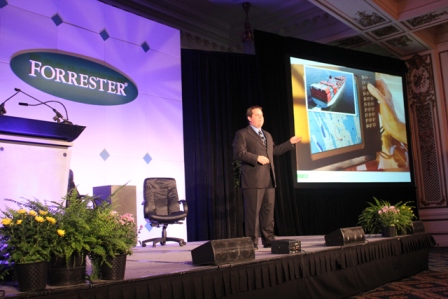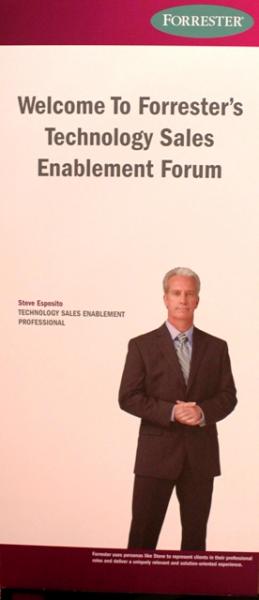The Sales Track View From Forrester’s Technology Sales Enablement Forum, 2011
Wow! We just came back from our first annual Technology Sales Enablement Forum (Feb. 14-15, 2011).
Brad Holmes, the practice leader serving Technology Sales Enablement, shared on his blog that the theme for the Forum was New Buyers, New Demands: Accelerating Sales Performance.
The objectives of the Forum were to help sales enablement professionals identify ways to:
- Shift vendor-centric product portfolios into customer-centric problem-solving pathways to business outcomes.
- Adapt a go-to-market approach to more effectively model the customer and help the sales team have more valuable sales conversations.
- Create strategic programs to better organize and coordinate sales support initiatives and spending.
What Happened, In Case You Missed It
 From the main stage, attendees heard from Forrester analysts, forward-leaning sales enablement professionals, and Forum partners like Savo and Jigsaw. Scott Santucci shared where buyers are heading and how tech vendors are worlds apart from that reality. He shared strategic views on how tech vendors can set up and drive business outcomes for clients, not just find a need and fill it with their solutions. In my keynote, I talked about the challenges that tech vendors are facing in building an outcomes-focused culture. I shared how vendors need to drive individual behaviors and organizational support to communicate more value to buyers. In the new outcome-focused reality, sales enablement professionals have a big role to play in helping bridge strategic plans to individual action. One of the keys to meeting the expectations of buyers (who demand business results and outcomes) is to focus on the differences and not the similarities. Forrester's research shows that "outcome selling" requires a different approach. Sellers need to communicate value in a bi-directional way, with their buyers, while ensuring they can identify high-level initiatives, communicating their role over a life cycle, define the end state for the buyer, locate the most responsible executive decision-maker, determine the impacted stakeholders, and create a measurable result. To communicate value in an outcome selling reality, marketing, portfolio, and sales teams need to work together.
From the main stage, attendees heard from Forrester analysts, forward-leaning sales enablement professionals, and Forum partners like Savo and Jigsaw. Scott Santucci shared where buyers are heading and how tech vendors are worlds apart from that reality. He shared strategic views on how tech vendors can set up and drive business outcomes for clients, not just find a need and fill it with their solutions. In my keynote, I talked about the challenges that tech vendors are facing in building an outcomes-focused culture. I shared how vendors need to drive individual behaviors and organizational support to communicate more value to buyers. In the new outcome-focused reality, sales enablement professionals have a big role to play in helping bridge strategic plans to individual action. One of the keys to meeting the expectations of buyers (who demand business results and outcomes) is to focus on the differences and not the similarities. Forrester's research shows that "outcome selling" requires a different approach. Sellers need to communicate value in a bi-directional way, with their buyers, while ensuring they can identify high-level initiatives, communicating their role over a life cycle, define the end state for the buyer, locate the most responsible executive decision-maker, determine the impacted stakeholders, and create a measurable result. To communicate value in an outcome selling reality, marketing, portfolio, and sales teams need to work together.
An Overview Of The Sales Track Discussions And Content
 To facilitate interaction and networking, the Forum breakout sessions were organized by a portfolio track, marketing track, and sales track. This structure allowed attendees to tailor their experience and select from the most appropriate content for their role. Since Forrester views sales enablement as a strategic discipline, not just as a lower-level task, this structure helped attendees find ways to execute as they drive towards more outcomes-focused approaches in their efforts to help their sales teams communicate value.
To facilitate interaction and networking, the Forum breakout sessions were organized by a portfolio track, marketing track, and sales track. This structure allowed attendees to tailor their experience and select from the most appropriate content for their role. Since Forrester views sales enablement as a strategic discipline, not just as a lower-level task, this structure helped attendees find ways to execute as they drive towards more outcomes-focused approaches in their efforts to help their sales teams communicate value.
For example, in the sales track, our theme was defining "From Where, To Where." In other words, sales teams need to fundamentally change their behaviors. They need to know how to communicate value in an outcomes-focused sale. To do that, sales enablement professionals must understand where the sales team is (with regard to those behaviors) and where the sales team is going (with regard to those behaviors). The changes that the track attendees specifically discussed as being necessary to help the sales team succeed bridging the gap in behavior were:
- The need for sales enablement as a discipline, not a task.
- The importance of cross-functional team dynamics.
- The evolution and clarity of the sales enablement job and role.
- The importance of measurement and metrics in gaining buy-in.
- The need for individual leadership and initiative from the sales enablement professionals.
The good thing is, even though these are tectonic shifts, tackling them doesn't require a re-organization. Sales enablement professionals in attendee companies are actively moving from a fragmented approach to a managed one and tackling real-world challenges. For example:
- Portfolio marketers are moving away from talking to customers about products to talking to customers about the real problems solved.
- Marketers are moving away from writing website copy that drives click-throughs to writing copy that can be used in specific outcomes-focused conversations.
- Sellers are moving away from driving activity with customers to driving more valuable sales conversations at the right altitude levels.
- Trainers are moving away from measuring training hours given and to talking to buyers about the outcomes and results sellers achieved.
Sales Track Content Highlights
Here are some of the things that happened in the sales track:
– We had a great buyer-insight panel discussion, where I shared the data Forrester has collected on buyer's views of the sellers who interact with them. Bobby Cameron, Forrester principal analyst in service to the CIO role, shared his 25+ years of insight on the evolution of the IT function and the CIO role. Bobby was able to bring our buyer data to life with stories, examples, and a lot of humor. He shared a lot of context and background regarding the way CIOs juggle many priorities within their IT groups as they move to a more service-oriented architecture and function. Most sales teams can't navigate the complexity, despite the fact they all want to be trusted advisors.
 – We heard from Avaya and about their work to create a sales overlay group to bring advanced technologies to market. They were successful in their work to identify the multiple sales involved in an extremely outcome-focused sale. Their work to identify the outcome that buyers needed required their team to align marketing content, team structure, and sales processes (planning processes, opportunity management processes, communication processes) from that outcome.
– We heard from Avaya and about their work to create a sales overlay group to bring advanced technologies to market. They were successful in their work to identify the multiple sales involved in an extremely outcome-focused sale. Their work to identify the outcome that buyers needed required their team to align marketing content, team structure, and sales processes (planning processes, opportunity management processes, communication processes) from that outcome.
– We heard from Red Hat and their work to align the behaviors of the sales team to a more outcome-focused sale. Buyers are evolving, and the behaviors of the sales team need to evolve, too. That means the team needed to work with all aspects of the people strategy, making it more than a training issue. The team was successful in creating a definition, building a methodology, and defining their approach to help sales team members across the globe understand what behaviors they need to exhibit from a buyer's perspective.
Forum Ambassadors
The sales track was also represented by Forum Ambassadors Duncan Murphy (Symantec) and Barb Vlacich (Kronos). Our Ambassadors helped collect inputs from attendees on breaks and during networking times while helping to identify major sub-themes from attendees. They were our "ears to the ground" and "feet on the street." Here is a short summary of some of the major themes as gathered from the Ambassadors in their discussions with attendees:
- Influencing influencers of sales reps is important. Someone needs to coordinate content, skills, and tool needs for salespeople across all segments within the sales channel. From strategic accounts to inside sales teams, each seller has specific needs that must be coordinated, especially with the shift to outcome selling
- Gain momentum by reinforcing commitment. Sales enablement professionals are re-evaluating the skills and personal development needs for members of their teams. They are also focusing more on metrics and measurements as they continue finding themselves presenting to the executive committee or heading for a seat at the table in the discussion of go-to-market strategies
- Getting the content right is extremely important. While salespeople communicate value, they must have something to talk about. In the shift to outcome selling, those content needs are massively different, and most product marketing functions need to change from focusing on products to focusing on the problem their products solve.
- Sometimes, we have to slow down to go fast. Most of the sales enablement professionals in the track were using cross-functional teams to drive change. Since most sales enablement programs are long-term, ongoing, and driving toward the outcomes buyers want, initiatives need to be thought through with a system's view.
- Define the right behaviors. While buyers are evolving, sales teams are falling behind. Of course, salespeople aren't the only group needing to change their behaviors; marketing, portfolio, and sales team members need to change their behaviors as well.
We hope we see you next year at our Forum! Overall, our team is proud of what our attendees presented and what they have accomplished to move their organizations from a transactional or product-selling organization to an increasing more outcomes-selling organization.
We had a great turnout. Here is a short list of represented companies:
Hewlett-Packard Company
Hitachi, Ltd. (Information & Telecommunications Systems)
Informatica Corp.
Intrepid Learning Solutions
Juniper Networks
Levi Strauss & Company NA
Merkle, Inc.
Metropolitan Life Insurance Company
Microchip Technology Inc.
NetApp, Inc.
Novell, Inc
Oracle
Orange Business Services
Qwest Communications
Red Hat, Inc.
Research In Motion Ltd.
RightNow Technologies
Royal Bank of Canada
SAP Global Marketing, Inc.
SAS Institute Inc.
SAVO Group
Seagate Technology LLC
Software AG USA, Inc.
Sterling Commerce (America), Inc. an IBM Company
SunGard
Symantec Corp.
TIBCO Software (formerly DataSynapse)
T-Systems International GmbH
Unisys Corp.
Verizon Business
Xerox
XFI Corp.